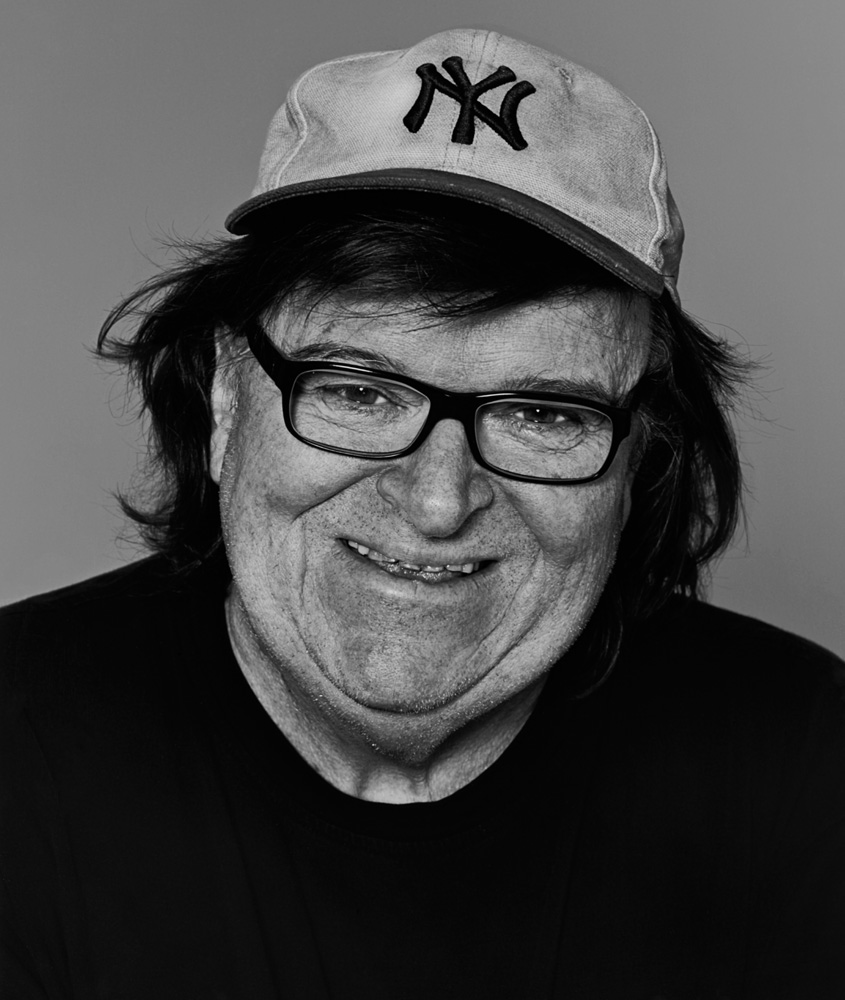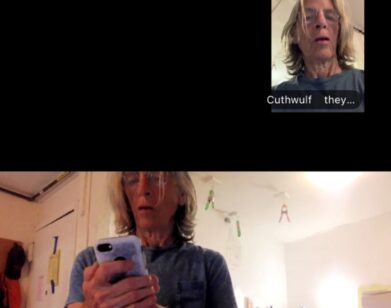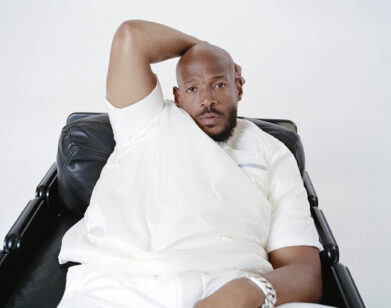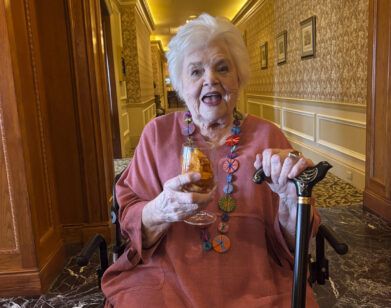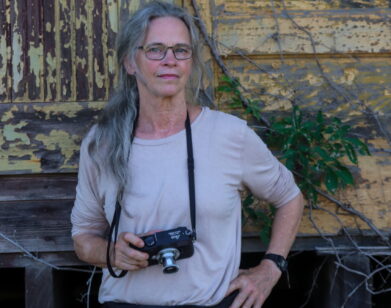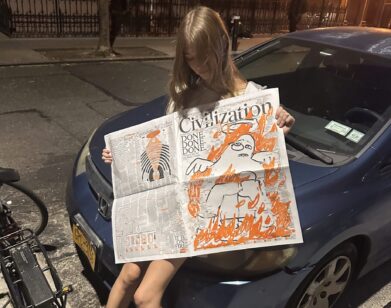Michael Moore
In 2016, toward the start of the presidential election, when Hillary Clinton was soaring in the polls, the legendary, ever-outspoken filmmaker Michael Moore predicted that Donald J. Trump would become the 45th president of the United States of America. His straightforward declaration threw many of Moore’s left-leaning fans for a loop. What had happened to his social compass, the one that directed him to investigate the effects of factory closures on his Midwestern working-class community in Roger & Me (1989) and America’s love affair with guns in Bowling for Columbine (2002), to name but two of his gonzo social documentaries? Had Michael Moore finally misread the times?
Of course he hadn’t. It must have been a Pyrrhic victory for the 63-year-old Flint, Michigan, native to have so accurately understood the American electorate. But acknowledging the danger is not the same as accepting it. Moore, one of the last few trusted muckrakers, has a number of new projects that take aim at the perilous lunacy of the current administration. There’s Michael Moore Live From the Apocalypse, a nonfiction television series to air on TNT next year, a website called Trumpileaks for political whistle-blowers, and a new feature documentary that, in part, explores the madness of Trump’s rise to power. As if that weren’t enough, he stars this month in a one-man Broadway show called The Terms of My Surrender. If you’re hoping for some light-minded distraction, you won’t find it when Moore takes the stage. (The promotional tagline asks, “Can a Broadway show bring down a sitting president?”) His good friend and onetime New York neighbor, the four-time Tony Award-winning writer and actor Harvey Fierstein, talked to the Broadway beginner about keeping the fight alive, wearing a dress, and how we’re going to get ourselves out of this mess.
HARVEY FIERSTEIN: To quote a line from one of my favorite movies: “So they drummed you right out of Hollywood and you come crawling back to Broadway. Well, Broadway doesn’t go for booze and dope.” [Moore laughs] Can you name that movie? Otherwise, you can’t come to Broadway.
MICHAEL MOORE: I can’t name the movie.
FIERSTEIN: I’m sorry, you’re not gay enough. Thank you for playing. [both laugh] It’s Valley of the Dolls, the bathroom scene.
MOORE: Oh, I could do many scenes from Beyond the Valley of the Dolls.
FIERSTEIN: Well, of course. Hi, Michael. How are you, doll?
MOORE: I’m doing well. How are you?
FIERSTEIN: Good. It’s been a long time. People don’t know that we lived together in the ’90s.
MOORE: I came from Flint, Michigan, to New York and moved into an apartment building on the Upper West Side. You were the first famous person I saw.
FIERSTEIN: Everybody from Letterman was in that building.
MOORE: Back in the late ’80s and early ’90s, a lot of creative people lived in that building.
FIERSTEIN: [Letterman band leader] Paul Shaffer was there.
MOORE: And [actress] Barbara Flynn and [actor] David Wayne. [Actor] Jeffrey Wright came later. And [comedian] Dana Carvey. I used to go to the gym, and he would be in there working out with [comedian] Kevin Nealon, and they would look at me like I should just give up. Why was I even there? But it was a time of creative people. There were comedians, poets, authors—even a couple of New York Rangers.
FIERSTEIN: Oh, really? That I didn’t know. But how would I? [both laugh] Are you still in that building?
MOORE: I’m still there.
FIERSTEIN: Wow. I am the Jared Kushner of small real estate. I bought high and sold low. I got out of there a long time ago. But anyway, I need to know something: Why the fuck did you want to do film in the first place? You were originally a print person, a writer, right?
MOORE: Correct. I started my own newspaper in Michigan called The Flint Voice. It was an alternative weekly newspaper, much like The Village Voice was at the time in New York. I did that for about a decade.
FIERSTEIN: And then you realized nobody knew how to read anymore.
MOORE: [laughs] Well, no. I got offered a job in San Francisco to be the editor of a national political magazine. And I thought, “Oh, that sounds like fun.” I moved out there and immediately had political differences with the owner of the magazine, and within four months I was fired. I was stuck in San Francisco unemployed.
FIERSTEIN: And straight, to list all the disadvantages.
MOORE: I was a sad and pathetic heterosexual living in San Francisco in the Upper Haight. I’d always gone to a lot of movies growing up. When I could drive a car, I’d get out of Flint and go to Ann Arbor or Detroit. Between the ages of 16 and 20, I probably saw everything by Kurosawa, Truffaut, Bergman …
FIERSTEIN: But documentaries are a different thing. These days, people have their iPhones, so everybody thinks they’re a filmmaker. But you actually had to go out and make a film.
MOORE: I did not personally like documentaries. They felt like medicine. There was always a wagging finger like, “You need to know this.” When I started thinking of making my first film, a documentary about Flint called Roger & Me, I remember telling my friends—none of us knew how to make a movie, we kind of taught ourselves—”Let’s not make a documentary. Let’s make a movie. Let’s make something people want to see on a Friday night.”
FIERSTEIN: My two favorite filmmakers are you and John Waters. And the thing you both have in common is that you are constantly saying, “Do you see what I’m seeing? Would you look over here?” It’s like a friend telling you a story.
MOORE: I think John Waters and I are both trying to work with people’s peripheral vision. In other words, we’re saying what you just said: “Take a look over here. You’re all looking straight ahead with blinders on. But there’s something going on in your peripheral vision, off to the side. There’s something profound going on.” Some of it provides the answer for why things are so fucked up. Some of it is just hilarious. John Waters introduced us to people we had not met, at least I hadn’t, living a straight Midwestern life. And I guess when I started making my films, I was hoping to do a similar thing.
FIERSTEIN: And you did. You showed audiences a world that we did not know existed, which is one of the best things an artist can do. And you changed documentaries forever. Do you feel that? Obviously you’re proud. One of your films won a fucking Academy Award and everything else.
MOORE: I think some of the more traditional documentary filmmakers didn’t appreciate what I was doing because they preferred the old-school method. So I took a lot of hits and some grief from people at that time. But in hindsight you can see where the line is drawn. Before Roger & Me, I think there might have been six or so documentaries in the history of film that had grossed over a million dollars at the box office. Since Roger & Me, there is something like 150. So, yes, I feel blessed that I had the opportunity to kick open the door and have people think of nonfiction filmmaking in a different way that reached an audience, that played in movie theaters.
FIERSTEIN: And then on top of that, there was this personality named Michael Moore. You cast yourself as the everyman letting us look through your eyes.
MOORE: I didn’t think of it that way at the time. I just decided to be me. I have a high school education. I was raised in an auto factory family. I was supposed to be building Buicks. And I quit that. I thought for a long time about the fact that when you’re from the working class, you don’t see us very much. You don’t see us in film or TV.
FIERSTEIN: It’s very similar to being gay, then.
MOORE: Yes, exactly. Any group that’s been invisible in film or on TV knows this feeling. If I remember correctly, you were the first openly gay actor to play an openly gay character on a sitcom.
FIERSTEIN: I was also the first guy to kiss Homer Simpson on the lips. That was a big breakthrough on the second season of The Simpsons. But getting back to you, we all came to know this persona of Michael Moore who looked like us and talked like us and was walking down the street pointing shit out and putting a spotlight on things to change a lot of minds. So what do we do now? It’s not enough to look. You need to see.
MOORE: They do see. The one thing we can feel good about right now is that the majority of our fellow Americans believe what you and I believe. Unfortunately, because our side is comprised of such wimps, when we get the shaft, we just take it. When Al Gore won in 2000, we allowed a man to take over the White House who the majority of American people didn’t want. Then it happened again in 2016. We were all like, “How did we let this happen again?” You know what? The other side, they wouldn’t have let it happen. I think everybody was afraid that had Trump won the popular vote but Hillary won the Electoral College, there were going to be riots and guns in the streets from all the white supremacist followers. But if we can look at the silver lining here, the good news is that the majority of Americans agree with us. They believe in climate change, that women should be paid the same as men, that you should be able to marry who you’re in love with. Look at every poll: the majority of Americans take the liberal position on these issues. Hillary won by nearly three million votes, and there were another over 7.5 million who didn’t want Trump and they voted Green or Libertarian.
FIERSTEIN: I’m not that worried about marriage equality. We know how to take that battle and we’ve taken it a lot faster than I thought we would. I’m worried about the stuff that doesn’t affect rich people. They will let gays get married because rich people are gay. I’m worried about the Voting Rights Act. I’m worried about the disenfranchisement of the poor. I’m worried about people losing their healthcare.
MOORE: That’s the harder road because the people you just mentioned are the people without power. They do not make the large campaign contributions. They do not have lobbyists working on their behalf. So it becomes incumbent upon those of us who are not poor and not without healthcare to devote a certain amount of our time to making sure that they are protected, but that we also build a better world so that they don’t have to worry about these things. In terms of the whole travel ban and immigration issue, churches, cities, and people are standing up and saying, “We’re not going to let you take people away—we’re going to provide sanctuary.”
FIERSTEIN: The other side is just so good at branding. They’re really good at branding their positions like, “Look what these people are taking from you.” I’m talking about the Paul Ryans of the world.
MOORE: They’re great at it, which is so strange because we have the majority of the creative people on our side—the writers and thinkers and artists and those who work with image and sound and do movies and plays and television. That is generally the liberal side of the fence, and yet we are incompetent when trying to come up with the right word, the right sentence, the right image. They’re so good at it, and yet, there are not a lot of right-wing film directors or comedians or rock ‘n’ roll bands. And there’s a reason for that. I’m not putting them down, other than to say that their brains are not adjusted in such a way where they’re thinking creatively and outside the box. You need to loosen up, to liberate your mind, to do that. So the fact that they are so good at what you just described is a sad commentary on us.
FIERSTEIN: Another thing that frightens me is that when [George W.] Bush got in, America was somehow saying, “Fuck you, I don’t want to read a newspaper or a book. Instead give me a president I can have a beer with.” When I was a kid, you aspired to be president if you were smart enough or worked hard enough. Now you can be president if you’re popular or outrageous.
MOORE: Growing up in a working-class factory town, people in my family didn’t have a college education. But they voted for Kennedy because they thought it was necessary to have a president who was smarter than them. The president should have a brain and know how to deal with situations that come up. Some 36 years later, we went from that to a man proudly proclaiming that he was a C student, and the genius of that was that he knew that millions of people would love it. But I will tell you who is going to lead us out of this trouble: young people, people of color, and women are going to lead us out of this mess. Look at the Women’s March, the day after the Inauguration: the largest demonstration in the history of this country and in multiple cities. People who never did these sorts of things before are doing them now for the first time. They’re jamming the Town Hall meetings. They are calling their congressperson’s office. And I don’t believe young people are apathetic and aren’t paying attention. They aren’t going to tolerate this because it’s their future. We’re in the age of the dying dinosaur, the angry white guy. They all know that their time is up. Even the demographic trends predict that by 2050, we’re not going to be a white-majority country. We’re going to be much more diverse and much more empathetic toward those who have less. We’ll have universal healthcare. These things will all happen because the younger generation and women and African Americans are going to make them happen.
FIERSTEIN: I hope you’re right. I need my hit of Michael Moore telling me it’s going to be okay if we just do something. Are you coming to Broadway to tell us what to do in order for that to happen? Are you going to lead us out of Egypt?
MOORE: Well, at least across Shubert Alley. [both laugh]
FIERSTEIN: So, what is this show?
MOORE: I’ve been wanting to create a great piece of theater. I’ve made films. I’ve had two TV series. I’ve written eight books. But the thing I did first as a 5-year-old was write little plays and get my sisters and the neighborhood kids to perform them with me. My mother took my two sisters and me to New York every other summer when we were kids. And nobody from Flint went to New York. We were lucky because my mom’s sister had married someone from Staten Island. So we drove from Flint to Staten Island. Then we took the ferry over every day and went to museums and plays on Broadway. The first one I ever saw was Fiddler on the Roof in 1965. I was 11. Those experiences had a profound impact on me. At 18, I wrote a one-act play and won a prize from the University of Michigan. So it’s been something I’ve always wanted to do.
FIERSTEIN: But what exactly is it, darling?
MOORE: It is a one-man show, although I don’t want to give away too much. It’s a piece that I’ve written and will perform, and, yes, it’s set in the time of Trump. It’s quite funny but not stand-up. I will tell some stories, engage the audience, and I think at the end of 85 minutes, you will leave the theater moved to act. You will see things done on a Broadway stage that perhaps you’d never seen before.
FIERSTEIN: You’re going to dance and sing, right? And wear a dress?
MOORE: Two out of three, yes.
FIERSTEIN: What are some of the actions you encourage? Should people run for office?
MOORE: I encourage everybody to think about running for office. Don’t leave it up to someone else.
FIERSTEIN: Who is a candidate you’re excited about? I’ve always been in love with Al Franken.
MOORE: Yes. Please, God, if you’re listening, why don’t the Democrats run beloved Americans as candidates? The Republicans do it all the time. For as much as the Republicans say, “Oh, those liberals, they’re all Hollywood”—actually the Republicans are the ones who run Hollywood and win. They run Reagan and win. They run Schwarzenegger and win. They run Gopher from The Love Boat and win. They run Sonny Bono and win.
FIERSTEIN: Can’t we get Oprah to run?
MOORE: Why don’t we run Oprah? Why don’t we run Tom Hanks? Why don’t we run Al Franken? I want a beloved American on the ballot. What about Michelle Obama? We can make a list. But it just can’t be a wonk. I do wish I could live in the time when John Kennedy was president. He was beloved. But we don’t run that anymore. We run Michael Dukakis or John Kerry, who are wonderful people—and I love Hillary Clinton—but this has to stop. When I saw that Joe Biden had formed a PAC a few weeks ago, I mean I love the guy but …
FIERSTEIN: Did you see that Jill [Biden] got a standing ovation last night at the Tony Awards?
MOORE: You mean the fuck-you standing ovation? As in, “Fuck you, Donald J. Trump.”
FIERSTEIN: Exactly. And then you turn on the TV today and you watch Melania get off that helicopter looking like she is going to Alcatraz. Listen, I know Trump. I sat next to him at a gay wedding, at Jordan Roth and Richie Jackson’s wedding. So we’re not talking about somebody we don’t know.
MOORE: We’ve all known Trump for a while. We’ve all had interactions with him. I’m surprised more of us don’t actually talk about it. When I moved to New York, roughly 27 years ago, I ran into him at a Planned Parenthood benefit—or some kind of benefit for women’s reproductive rights.
FIERSTEIN: Exactly. And now Melania is wishing her son’s school term could continue for a few more months. Listen, I’m looking forward to your show because we need our heroes, our truth-tellers, out there. I hope it isn’t laying anything too heavy on you to say that we have come to count on Michael Moore standing in front of the building saying, “You’ve got to see what’s going on in the alley.”
MOORE: What is your advice to me as the long-standing, beloved mayor of Broadway?
FIERSTEIN: Wear a dress.
HARVEY FIERSTEIN IS A FOUR-TIME TONY AWARD-WINNING ACTOR AND WRITER. HE MOST RECENTLY STARRED IN THE OFF BROADWAY PLAY GENTLY DOWN THE STREAM, AT THE PUBLIC THEATER.

